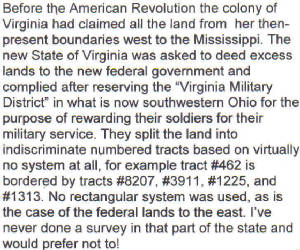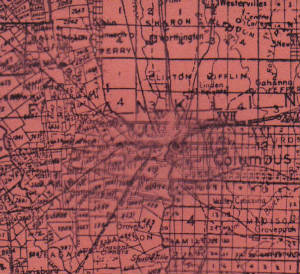|
|
 |
Overturn the Everson Decision!

The U.S. Supreme Court's Everson case is extremely important to the Americans
United for Separation of Church & State.
February 10, 2007 marked Everson's 60th anniversary, and AU's Assoc. Editor Rob Boston wrote a lengthy tribute to that historic decision in AU's website and he roundly criticizes
televangelist Pat Robertson for wanting to see Everson overturned. Until you get to the place where Boston and
AU want to see it overturned, too.
Let's start with the basics. The First ammendment to the U.S. Constitution begins
"Congress shall make no law respecting an establishment of religion, or prohibiting
the free exercise thereof, ....." Contrary to popular belief the Constitution makes no mention
of "Separation of Church and State."
But in 1947 the Supreme Court ruled that the First amendment applied to the states,
also. They based this on the Fourteenth amendment which prohibits a state from passing any law abridging the priveleges
or immunities of citizens of the U.S.
1925 - Pierce v. Society of Sisters of the Holy Names of Jesus and Mary
This landmark decision over-turned an Oregon law that would have required all children to attend only the
public schools. The decision affirmed the right of parents to choose the type of education they wanted for their children
and also affirmed the right of the state to reasonably regulate private schools. The state already had ruled that parents
had the right to decide between public or private schools, but many voters, egged on by the Catholic-hating Ku Klux Klan,
passed the law by referendum, putting an end to Catholic schools, until it was then overturned by the High Court.
1930 - Cochran v. Louisiana State Board of Education
Decision upheld a Louisiana statute that allowed expenditure of public/ state funds to purchase and supply
nonsectarian textbooks to parochial school students. It thus supported the Constitutionality of using public funds to help
a religious school perform non-religious functions.
1947 - Everson v. Board of Education
Decision upheld a New Jersey program that established the precedent that a state may provide, with public
money, bus transportation to and from school for students in parochial schools.
Americans United for Separation of Church and State, as their name implies, takes a
fanatical stand for complete separation. They'd like to see the 1925 Cochran decision overturned. They seldom
say the same thing about Everson, which passed 5 to 4, because while hating the decision they love the majority
opinion written by Assoc. Justice Hugo Black, containing the words (All text in gray is from
Boston's article):
“The ‘establishment of religion’ clause of the First
Amendment means at least this: Neither a state nor the Federal Government can set up a church. Neither can pass laws which
aid one religion, aid all religions, or prefer one religion over another.
“Neither can force nor influence a person to go to or to remain away from church
against his will or force him to profess a belief or disbelief in any religion. No person can be punished for entertaining
or professing religious beliefs or disbeliefs, for church attendance or non-attendance.
“No tax in any amount, large or small, can be levied to support any religious
activities or institutions, whatever they may be called, or whatever form they may adopt to teach or practice religion. Neither
a state nor the Federal Government can, openly or secretly, participate in the affairs of any religious organizations or groups
and vice versa.
“In the words of Jefferson, the clause against establishment of religion by
law was intended to erect ‘a wall of separation between church and State.’”
The above was unanimously approved by the nine justices as the rule to be followed
in all future government/religion conflicts. (And it's the part most often quoted by AU). But the Court had decided 5-4, with Black voting with the majoriy, that those bus subsidies were Constitutional.
Had Black voted in direct conflict with his own rule? Boston continues:
Black’s conclusion to the ruling reads, “It appears that these parochial
schools meet New Jersey’s requirements. The State contributes no money to the schools. It does not support them. Its
legislation, as applied, does no more than provide a general program to help parents get their children, regardless of their
religion, safely and expeditiously to and from accredited schools. The First Amendment has erected a wall between church and
state. That wall must be kept high and impregnable. We could not approve the slightest breach. New Jersey has not breached
it here.”
Had not breached it even though they had approved spending public
funds to transport kids to Catholic schools as long it transports all students as "part of a general program?" And as
long as "The State contributes no money to the schools?" Such a definition of Constitutional
aid to religion was not acceptable to A.U., whose website continues:
AU’s governing manifesto, issued on Nov. 20, 1947, cites
the Everson case and the earlier Cochran decision, noting, “The four dissenting justices in the bus-transportation
case solemnly warned the nation that these two breaches in the wall of separating church and state are only the
beginning. ‘That a third and a fourth breach, and still others, will be attempted, we may be sure,’ say the
dissenting justices.”
Boston quotes Erwin Chemerinsky, Alston & Bird Professor of Law and Political
Science at Duke University “It is striking that all nine members of the
Supreme Court saw the Establishment Clause that way. I believe that they are right that this is how the Establishment
Clause is best understood.”
Not so striking, because they didn't all see it the same way. The five assenters, including Black, all saw the Constitutionality
of government aiding a religious schools as long as "the
State contributes no money to the schools. It does
not support them. Its legislation, as applied, does no more than provide a general program to help all
such schools perform a non-religious service. Isn't that the same rationale as paying for non-religious textbooks, as
in Cochran? Isn't that similar in concept to furnishing vouchers to help all parents pay for the cost of non-religious portions
of their education? Admittedly what portions are "non-religious" would have to be addressed, but the principal of St.
Peter's School (K-12) here in Mansfield, OH once told me they try to be more careful than the public schools
to keep religion out of non-sectarian subject matter.
But the four Everson dissenters saw it differently,
according to Assoc. Justice Rutledge writing in the dissenting opinion. Boston continues AU’s
governing manifesto, issued on Nov. 20, 1947, cites the Everson case and the earlier Cochran decision, noting,
“The four dissenting justices in the bus-transportation case solemnly warned the nation that these two breaches in the
wall of separating church and state are only the beginning. ‘That a third and a fourth breach, and still
others, will be attempted, we may be sure,’ say the dissenting justices.”
About 38 years later
Justice William H. Rehnquist called Everson’s lofty rhetoric “useless as a guide to sound constitutional
adjudication” and labeled Jefferson’s wall metaphor “useless as a guide to judging.” Boston,
of course, disagrees with Rhenquist but to outlaw use of taxes to support religious costs
in the face of complete disagreement of what "religious costs" even means certainly appears
to be useless. Is
bus fare a religious cost? No, said the majority. Yes, said the minority. It's all a matter of opinion and the Everson case
CREATES a split opinion.
Televangelist
Pat Robertson, says AU, claims that Justice Black is riled up over the Everson decision, maintaining, together with other
"religious rightists," that Justice Black was anti-Catholic. Their website here talks about
the usually unmentioned upholding of use of public funds to pay parochial school bus fares to prove that the religious right
is wrong. Boston says Robertson is not the only one riled up over Everson.
That is correct. For
60 years Americans United has been riled up over it, too, and has wanted it overturned. Obviously AU's reasons for wanting Everson to go away are 180 degrees different from Robertson's.
And to leave no doubt that it's Cochran
and Everson that AU wants to see overturned I'll quote from AU's actual Manifesto: "The Federal Supreme Court in two decisions
has confirmed State legislation which sanctions the use of public school funds to provide free textbooks for parochial schools
(1930) and to transport pupils to school (1947)." Boston goes on to describe the next paragraph as saying "the manifesto goes on to say that AU is
determined to assert its full strength to the end that there
shall be no more breaches in this wall, that the breaches already made shall be repaired, and that the complete separation
of church and state in an undivided state-supported educational system shall be maintained.”
Ouch! Does Boston's
article mean Americans United's goal is still to see those two cases (Cochran and Everson) overturned? And does that
"complete separation of church and state in an undivided state-supported educational system"
mean overturning Pierce v. Society of Sisters and thereby putting Catholic schools out of business, just as Ku Klux Klan had
wanted to do?
RhymeCon
to top & navigation links
_____________________________________________________________
It was no big deal. In New Jersey a guy named Everson sued the Board of Education
of Ewing Township to prevent them from offering free transportation of children to Catholic parochial schools.
In the U.S. Supreme Court he lost the case; something about the school board having a right to offer this public service to
ALL school children regardless of where they went to school. Justice Black wrote the majortiy opinion. (Click on
In his opinion he said The "establishment of religion" clause of the
First Amendment means at least this: Neither a state nor the Federal Government can set up a church. Neither can pass laws
which aid one religion, aid all religions, or prefer one religion over another. Neither can force nor influence a person to
go to or to remain away from church against his will or force him to profess a belief or disbelief in any religion. No person
can be punished for entertaining or professing religious beliefs or disbeliefs, for church attendance or non-attendance. No
tax in any amount, large or small, can be levied to support any religious activities or institutions, whatever they may be
called, or whatever form they may adopt to teach or practice religion. Neither a state nor the Federal Government can, openly
or secretly, participate in the affairs of any religious organizations or groups and vice versa. In the words of Jefferson, the clause against establishment of religion by law was intended
to erect "a wall of separation between church and State."
Well, it seems odd (to this layman at least) for a justice to base a legal opinion
on something written not as a court decision but upon Jefferson's words in a letter, ripped right out of the specific
context in which he wrote it.
But stranger still are Black's words "Vice Versa." They mean you can interchange
the objective and subjective phrases and it still remains true, and thus Black was also saying "No religious organization can, openly or secretly, participate in the affairs of a state or the Federal
Government." This would mean that a church could not oppose a political candidate it believed to
be an evil person, or encourage the public to vote a certain way.
Yet labor unions can, and do, such things. Farm organizations or industries of almost
every kind can, and do, such things. Virtually every legitimate organization is encouraged to take part in their government but
if churches can't, what exactly does "freedom of religion" mean?
But someone might say "Yeah, but if churches did it they'd have to give up tax-exempt
status because they're 501(c) (3) organizations." True, but this has nothing to do with the First Amendment; it's the rule
for all tax-exempt non-profits like the American Cancer Society and Americans United for Ch. & St.
And if one holds that the activities of churches are limited by the
First Amendment, which doesn't say anything resembling that but does prohibit the Congress from interfering with religion,
then the First Amendment is a direct violation of the First Amendment.
RhymeCon
________________________________________________________________

Choosing between right and wrong isn’t always easy, for a church or anybody
else. In the Abortion issue I can really see how two different churches can promote two different stances, for when you think
of a late-term “fetus” for example, differing from a “baby” only by a trip through the birth canal
(or Caesarean incision), the fact that the unborn human can legally be tortured to death is outrageous beyond discription.
How could anyone possibly condone it?
But then I read an interview with a pregnant rape victim who could think only
with horror about the thing growing wihin her. In her trauma she could not possibly
think of that thing being “her baby” and she could imagine only two alternatives: abortion and suicide. I’ll
not condemn her for choosing the former.
Some would claim the definition of “fetus” is different from “human being” but it seems a weak argument at best. And weaker still if those
same people would demand prison for a person convicted of torturing a dog to death; the dog isn’t a human being either.
Some would claim it’s only a certain strain of Christianity who opposes
abortion but that’s the weakest argument of all. News columnist Nat Hentoff is ouspokenly against it and he’s a Jewish atheist (Jewish by ethnicity though not by beliefs).
And Dr. Bernard Nathason, who conducted or supervised 60,000 abortions and co-founded National Abortion
Rights Action League (NARAL) which changed its name after the Supreme Court’s Roe v. Wade decision overturned the anti-abortion
laws of all states, was an atheist at the time he became convinced of the pain he had inflicted on innocent life and became
a leading abortion foe.
But I recently read an Aug. 24, 2007 post on the website of Americans United for Separation of Church and State. Some excerpts:
"Are Southern Baptist leaders ratcheting up their
political operation? It
sure looks like it. The Southern Baptist Convention (SBC) is the nation’s largest Protestant denomination, and its fundamentalist
leadership is struggling to gain greater political clout."
It continues that Richard
Land, president of the SBC’s Ethics and Religious Liberty Commission
“visits Washington
often from his primary office in Nashville and is wielding an ever-increasing
influence in his efforts to make the will of Christ supreme in public affairs.”
Wow! What are those Southern Baptists pushing for? Running
an SBC candidate for President of the U.S.? Placing WWJD license plates on all Federal vehicles? To contnue:
"ERLC’s Land, who has
been one of the most faithful cheerleaders for the Bush administration, is blunt about the group’s religious-political
agenda. In an essay on ERLC’s Web site, he insists, “We must convince Christians
to run for elected offices at every level, then encourage them to act on their faith-based convictions while they are in office.
We must walk, talk, and vote our values.”
(By the way, if you follow that ERLC link above I predict
you'll agree that Land makes a lot more sense than A.U. will admit.)
"Land denies that Southern Baptists want a government
that gets involved in religion, but it sure sounds like it."
It does? Sounds more to me that he wants his church to get involved in government.
“'When we preach that Gospel,' he writes, 'and God has blessed it and people’s
hearts and minds have been changed, then they have the right as citizens to come forth in the public arena and say, ‘This
is wrong, and we want it stopped.'
That sounds an awful lot like theocracy to me.
'For example,' he continued, 'abortion is the
murder of babies, and we want laws to change it. When we convince a majority of Americans that we are right, that’s
not called a theocracy, that’s called the democratic process.'
Land is clearly saying that religious majorities have
the right to impose their theologically grounded beliefs on all Americans by force of law. That sounds an awful lot like theocracy
to me."
Theologically grounded beliefs? Like whether Mary ascended
or whether to face Mecca when you pray? Things that don’t really affect
anybody who doesn't believe as you do? Things like choosing whether a pregnant woman must go full term or whether a living
but very young human being must be torn apart limb from limb doesn’t affect anybody because by someone else’s
definition that human being isn’t really a “baby” yet? You have a moral right to torture a dog or cat to
death unless your religion has some kind of silly rule against it, so why not a prebirth baby?
If opposition to abortion is a "theologically grounded
belief" wouldn't defense of abortion be a "theologically grounded belief" too?
Can the A.U. chief executive (who happens to be a minister
of the United Church of Christ as well as an attorney) say in a sermon “Let us always remember that whatever our Christ
tought us doesn’t really mean anything to this world; it doesn't affect a single person except ourselves; Christianity has absolutely no responsibility to human society?”
Churches have, at times in world history, done
great things for our fellow man. Churches have, at other times, fallen woefully short, horribly short. Americans United would
have us believe that our faith must have no visible effects and must offend no one; it’s basically a bunch
of hocus pocus.
RhymeCon
______________________________________________________________
How the Conservative Christians Killed the Pro-Life Cause (The flip side of the
coin)
I was talking to a young fundamentalist preacher about the pro-life
issue and said something like "a lot of anti-abortion people would accept abortion in cases of rape or incest."
He shook his head vigorously - "No. Practically none of them would."
I think I know what he meant but I'm not sure he knew what
I meant. I think he was talking about people who shared his religious views. I was talking about people, regardless of
their religious beliefs, who oppose abortion.
I found the website http://www.godlessprolifers.org/home.html of the Atheist and Agnostic Pro-Life League whose members range from "strong atheist" to "weak agnostic."
Their pro-life views range from "no exceptions" to "exceptions for the life of the mother, for rape, and for incest."
But then I read pro-life letters to the editor of our local paper ending with the obligitory bible-verse-or-two and wonder
"If those letter writers sincerely want to fight abortion why do they want to expel non-theists from their ranks?"
And, what was completely predictable, they've handed the pro-choicers one of their
favorite arguments, "They're trying to force their religious beliefs on others."
And when Richard Land (see previous post) says “'When
we preach that Gospel, and God has blessed it and people’s hearts and minds have been changed, then they have the right
as citizens to come forth in the public arena and say, ‘This is wrong, and we want it stopped," A worthy goal perhaps but I wonder what makes him think it's necessary to change hearts and minds
in the first place? How does he know people aren't already leaning toward the pro-life stance but are perfectly content
with their own spiritual state and I sense that he really means "To heck with the abortion issue; all I really want is to
proselytize."
Winning converts and overturning Roe v. Wade may both be worthy
goals but to me, dismissing one as a means to achieve the other costs his credibility on both.
RymeCon
___________________________________________________
Thomas Jefferson's Other Letter
It's O.K. for Government to Finance Religion!
Tom Jefferson wrote another letter. Actually he wrote thousands, and hundreds of them are on-line, but he wrote one
that shows he was not averse to using government funds to help spread religion.
For the
past 60 years, since Justice Hugo Black quoted the phrase “a wall of separation between church and state,” from
Jefferson’s Jan. 1, 1802 letter to the Danbury Baptists, and declared “the wall must be kept high and impregnable. We could not approve the slightest breach,” many
have believed (wrongly) it’s actually in the Constitution. Yet virtually everyone has ignored the significance of a
paragraph from Jefferson's letter to James Madison, Dec. 20, 1787:
"I am much pleased that the sale of Western lands
is so successful. I hope they will absorb all the Certificates of our Domestic debt speedily, in the first place, and that
then offered for cash they will do the same by our foreign one."
I'll call this the RhymeCon letter, for speaking as an Ohio surveyor it appears that few people have noticed
something that caught my breath. It involves the financial commitment our Continental Congress made to organized religion to get the land
sold.
One
source of information is the 1925 Ohio Cooperative Topographic Survey (OCTS), Volume III, Final Report. Another is "The Official Ohio Lands Book" by Dr. George
W. Knepper, available from the Ohio Auditor of State. Others may be found by searching "Land Ordinance of 1785." Another
is an on-line book, "OHIO LANDS- a short history" (copyright Ohio Auditor of State).
As a Virginia delegate to the Continental Congress Jefferson was the first
chairman of a committee to plan the legal and governmental framework for expanding our nation westward. The Congress was also
working on plans for surveying of federally-owned lands into a checkerboard of squares,
something no government had done since the Roman Empire. This would simplify the selling of the “western lands,” east of the Mississippi and northwest of the Ohio River.
Jefferson wrote the first draft, the Northwest Ordinance of 1784, which was passed by Congress but was never put into effect. It prohibitted slavery in the northwest
territory but this part was defeated by several southern states. It was re-written, partly by Nathan Dane, while
Jefferson was Minister to France, and was adopted as the Northwest Ordinance of 1787.
The 1787 ordinance guided the nation's
westward expansion. It provided for the governing of territorial lands,
and the legal means for a territory to apply for statehood, requiring
(a) a minimum population of 60,000,
(b) a Congressional enabling ordinance,
and
(c) an approved state constitution.
The ordinance included a Bill of Rights
for the Northwest Territory and prohibitted slavery. It assigned to the government (not in Jefferson's version) the
duty of promoting religion, Article 3 beginning "Religion, morality, and knowledge, being necessary to good government
and the happiness of mankind, schools and the means of education shall forever be encouraged." The bill provided "that no
man shall be compelled to frequent or support any religious opinions or belief."


The Continental Congress was also working on the Land Ordinance of May 20, 1785, which stated that prior to sale,
lands would be surveyed into six mile by six mile “Townships” and
each township would be surveyed into 36 numbered mile-square “Sections.” It required that in each township, Section 16 was reserved for maintenance of schools, and Sections 8,11, 26, and 29 were reserved for future sale or distribution as
Congress might determine. (One of the purposes of this land, as later determined, was to support religion). In addition, certain
lands were to be reserved for Christian Indians as encouragement to convert other Indians to their faith.
|

|
|
The first land sold was the "Seven Ranges," the first seven rows of townships, or the eastermost 42 miles of Ohio, starting with the Pensylvania-Ohio
line north of what is now East Liverpool. Sales were disappointing partly because people weren't interested in
moving their families to a frontier without the amenities of civilization including churches and stable government.
On Oct. 27, 1787, two months before the RhymeCon letter, a group of
land speculators, "The Ohio Company," signed a contract with the Board of Treasury for the puchase of 1.5 million acres in southeastern
Ohio. Governmental procedures were improved. Section 16 was still reserved for schools but of those four other
sections retained by Congress, Section 29 was set aside specifically for religious purposes.
The project was broken down into two phases. The contract for the second phase of the sale omitted the Section
29 for Religion clause but the Ohio Company complied with it voluntarily. I was recently informed that "It wasn't voluntary;
they mistakenly thought the clause was still in the contract and asked the government for ten sections back again but
failed in their request."
Regardless of whether true or not the fact remains that they voluntarily signed the
contract based on what they believed it said.
The purchase was of such magnitude, and of such importance to a government who desperately needed
money to pay the huge (in those days) national wartime debt of more than 100 million dollars under the Articles of Confederation
which had not enabled taxation, that on May 10, 1792 President George Washington himself signed the deed. At that time Thomas Jefferson
was President Washington's secretary of state.
But
the importance of this transfer and the particular knowledge that Jefferson had of the system, since he was father of the
system in the first place, makes it seem probable that he was aware that federal capital would be used to furthur
religion in newly developing public lands.
The next major land purchase, the Symmes Purchase, at the present Cincinnati area, again
called for reserving Section 29 for religion. John Cleves Symmes had contracted to buy one million
acres in 1788 but it had to be modified because of a conflict with another planned survey. Again
the deed was signed by President Washington, on Sept. 30, 1794, but Jefferson had retired from public life (temporarily as it turned out) the year before.
From 1785 to '89 Jefferson served as minister to France,
but he maintained constant communication by his letters, a large number of which can be found on-line.
I could find no hint in
any letter of Jefferson's that he was disturbed by the American government paying in this manner to aid the
spread of religion.
And of the money from those
lands dedicated to schools and religion? That 1925 OCTS report, P. 77 says the funds, by Ohio State Law of March 28, 1917,
were being held in a "Common School Fund" and a "Ministerial Fund." And some churches were still receiving interest
from the ministerial fund until the State of Ohio voted to have it transferred to the "Common School Fund" in 1968.
In 1801 the newly inaugurated President Thomas Jefferson wrote that
letter to Baptists in Danbury
Connecticut. They
had pled with him to uphold their religious rights against their state’s domineering Congregational
church. Jefferson replied that when the nation passed
the Constitution’s First Amendment nine years before, prohibiting Congress from "establishing
religion," they had created “a wall of separation between church and state.” One of today's
hottest anger buttons is whether Amendment One means what it says or goes much farther, as that
Separation phrase might imply.
The appointed Governor of the Northwest Territory was Arthur St. Clair, of the Federalist
Party. Thomas Jefferson had founded the rival Democratic-Republican Party. Federalists favored strong federal control of national
economics, (much as the liberals of today) while Jefferson believed in Americans living their lives free of governmental
controls (much as present day conservatives).
About the time Jefferson became president, Ohio applied for statehood.
It was of vital importance to Jefferson that statehood be granted and that Ohio elect her own government, which would probably
be Democratic-Republican, and just as important to St. Clair that statehood be prevented. Congress passed the enabling
act on April 30, 1802, although Ohio had only about 45,000 population (by the 1800 census) whereas 60,000 were required. They
reasoned that by the time Ohio had finished writing a constitution and getting it approved by Congress Ohio would
have achieved the population target.
St. Clair ignored the enabling legislation and announced that the west boundary
of Ohio must be the Scioto River in about the planned center of the state (through present-day Columbus), preventing
either half from even approaching the goal. Even if President Jefferson had misgivings about the support government
was giving to religion he didn't mention it; the first priority was to grant statehood.
Jefferson fired St. Clair. Ohio became the 17 th state on March 1, 1803.
To be sure this isn't a slam dunk. Rather than just a letter of his pleasure
that land sales were going well I'd prefer to find a Jeffersonian letter that stated what he surely must have known to be
true - that one of the reasons for good sales was that the government was financing religion.
But if a phrase about a "Wall of Separation" in Jefferson's letter to the Danbury
Baptists, lifted right out of its specific context, should be regarded by some as having all the weight of a Constitutional
Amendment, does it make sense for them to completely ignore that another Jefferson letter said he was "much
pleased" in the RESULTS of the "Wall of Separation" being completely violated?
| Cover art by Annette Salrin |

|
| "Official Ohio Lands Book" |

top of page & navigation links
|
 |
|
|
|
Separation of Church & State = Freedom of Speech Except for Churches
|
|
|
 |

